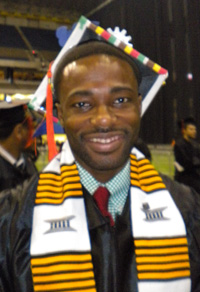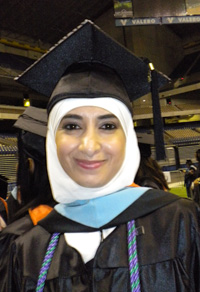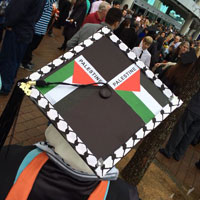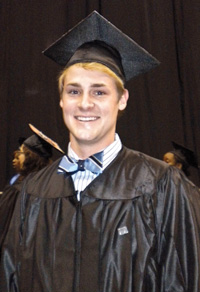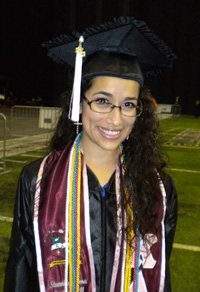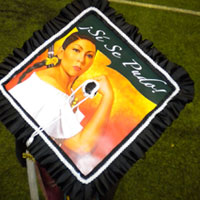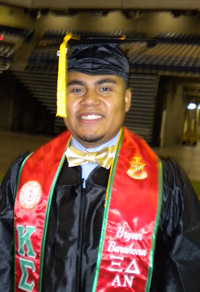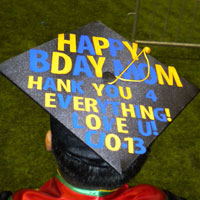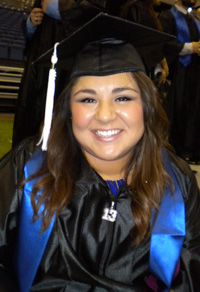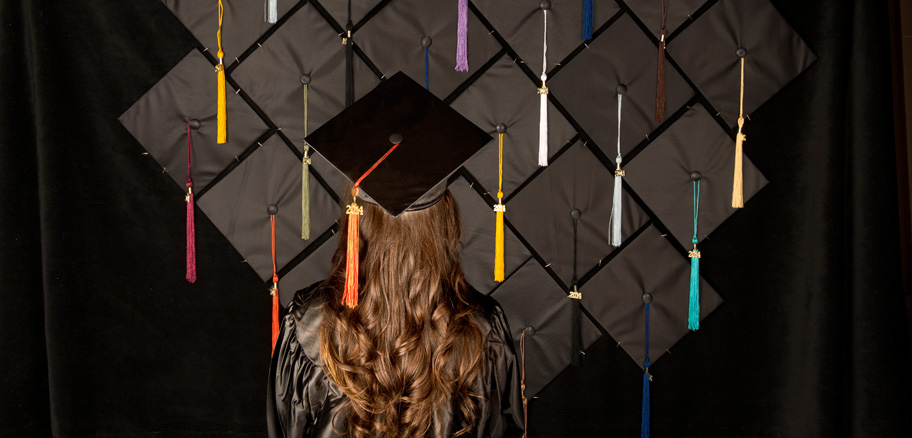
Under the Mortarboard
Student Stories
It’s a tradition with roots in the 15th century, when pearls and crystals decorated the caps of scholars who had reached certain heights in academia. Today, degree programs are represented in a rainbow of tassles. And whether edged in lights, wrapped in fabric or topped with glitter, the flat, square surface of the mortarboard provides an empty canvas for students to share the triumphs, struggles and fun that make up the college experience. Decorating mortarboards has become an unofficial highlight of commencement. As UTSA celebrates 100,000 graduates, meet the individuals behind some of the ceremony’s unique mortarboard stories.
At the December commencement, thousands of students walked across the stage to get their diplomas. They are an example of those who have come before and the students who will follow. Get to know just a few of them.
Anthony Idi, B.S., electrical engineering
Graduation day was no small event for Anthony Idi and his family.
His grandmother flew in from Nigeria and was joined by more than 20 other family members and friends from various cities, including Chicago and New Mexico.
“I was the first in my family to graduate from a four-year college,” Idi said. “It was a big deal.”
He and a friend worked on his mortarboard before commencement. The elaborate design honors his African roots with red, green, yellow, white and black stripes.
The gears symbolize his love of engineering, and he gave a gold glitter shout-out to his fraternity, Alpha Phi Alpha. And of course, he needed a roadrunner.
After walking the stage and getting his diploma, tears welled up in his eyes.
“It was the feeling of finally being done and accomplishing something that was very difficult and challenging,” Idi said. “That was one of the greatest feelings ever.”
Idi said that high school didn’t prepare him for the rigors of university work, so he had to learn good study habits and time management, which could be difficult when working to pay for living expenses and school. At one point Idi had an overnight job, so even finding time to sleep became an issue.
The oldest of five, Idi also wanted to be there for his siblings in Houston, whether to show support at a sporting event or to help care for a sister with a rare condition that required a lot of hospitalization.
“My parents, they work so much,” Idi said about his mom and dad, who are both licensed vocational nurses.
Idi felt he couldn’t fail them or the rest of his family.
In July, he will begin his new job at Microsoft in Washington, D.C.
Sajeda Atari, M.A., education
A thirst for knowledge brought Sajeda Atari to the United States to continue her graduate studies.
“Education in the U.S. is really advanced,” Atari said at the ceremony. “Although I got my master’s in Jordan, it’s not enough. I felt I needed to expand my experience.”
A friend who already was a graduate student at UTSA encouraged her to apply, especially because Atari wanted to study early childhood education.
Sadly, that friend left San Antonio before Atari arrived.
“I came all by myself,” Atari said. “It was very challenging at the beginning. However, I was blessed to spend an amazing time discovering San Antonio with some great friends that I have met at UTSA.”
Atari earned her second master’s degree in 15 months and as graduation day approached she decided she wanted to honor her ancestry. She attached two small Palestinian flags to the top of her mortarboard.
“I love Jordan and I was born and raised there. I have my friends and family there,” Atari said. “But knowing I can’t go to my country of origin, it’s really hard. It feels like it should be my choice. I carry my country in my heart. I felt I should carry it with me this day.”
Keeping heritage alive became the basis for Atari’s graduate project. She studied how Arab immigrant mothers can help their children maintain their language.
For Atari, studying outside of Jordan has opened up a whole new world.
“I’m a completely different person,” she said. “Now I have so much that I’m taking back with me. I hope to share with my colleagues.”
In March, Atari said via email from Jordan that after returning with her degree she became the director of the Social Development Training Center at ZENID, a nonprofit that promotes learning for development.
She’s also creating up-to-date training materials, she said.
The English immersion at UTSA also came in handy when she returned to work and gave two separate high-profile presentations— one was for Germany’s first lady and the other for the UNESCO director general.
Forrest McCord, B.S., kinesiology
By the time Forrest McCord graduated from high school, he already wanted a break from the hobby that had become a profession.
The world champion pistol shooter had just helped the United States junior team win a gold medal in Bali at the 2008 International Practical Shooting Confederation World Shoot XV.
He was even offered a spot on the elite U.S. Army Marksmanship Unit at Fort Benning in Georgia.
Still, McCord realized he wanted to do something different.
“I turned them down so I could get my degree,” he said.
He didn’t have a lot of time to focus on marksmanship while also earning his bachelor’s. But during his junior year he did have a stint on the History Channel competition show “Top Shot.”
“I missed it so much,” McCord said. “It was a huge part of my life.”
The Houston native began shooting at age 13 when his mother took him to a gun range for the first time. Calling it his “niche,” McCord said he had a fascination with shooting and pistols that quickly became his strength.
Walking across the stage to receive his diploma signified the end of his shooting hiatus. So, McCord spent a few hours the day before carefully crafting the pistol motif that covered his mortarboard.
He had temporarily given up shooting to earn his degree; graduating meant that he could get back to the career he said he was meant to have.
In March, McCord was waiting for his military paperwork to be completed. He said he hopes to become an Army ranger.
Daisy Rios, B.A., sociology
Growing up, Daisy Rios often looked up to the social workers who helped her through trying times.
She was in a mentorship program at her Houston high school and thought that when she got older she too wanted to be a mentor. Now that she has graduated, she’s working at Child Protective Services in San Antonio. She plans to stay here to get her master’s degree in social work.
Rios was the first in her family to graduate from college, so the December ceremony was met with jubilation by her family.
“They were extremely proud, especially my grandmother,” Rios said. “And they were excited when they saw my mortarboard. They thought it was very cute.”
When Rios found a photo of a Latina woman that was a play on the traditional Rosie the Riveter icon, she knew it was perfect.
“I’m really in touch with my culture,” Rios said. “It’s a message to Latinos. You can do it, because I did it. It’s possible.”
She said she wants to help people the way she was helped in the past, and especially hopes to focus on minorities who lack resources.
“Education is a way out of poverty,” Rios said.
Bryan Alexis Barahona, B.A., psychology
During his years at UTSA, Bryan Barahona would go over finances every month with his mother during a phone call to their Houston home.
They would add her disability check—her only income—to what he made working on campus. Anything else that came from other family members, like Barahona’s uncle or grandmother, was also included.
“We tried to figure out my rent, plus car and bills and all the stuff she needed on her end,” Barahona said. “I don’t know how we did it. A lot of my family helped, too.”
The group effort definitely made a difference for Barahona—an only child raised by a single mother from Honduras who worked at a retirement home until she had to go on disability.
Like other graduates, Barahona used his mortarboard as a blank canvas to honor the family and friends who supported him.
Since her birthday was two days before the fall ceremony, Barahona marked the occasion on his mortarboard and thanked her for all of her help. Although, he said, the “T” did fall off the message at some point.
With or without that letter, however, for the woman who was always there for him, the meaning was clear.
Gina Solorzano, B.A., multidisciplinary studies
Like many of her fellow graduates, Gina Solorzano wanted to show her mother how much she appreciated all of her support.
“My mom always told me, ‘You go, girl’ when I was growing up,” Solorzano said.
She decided that the phrase used to encourage her through major tests, sporting events or stressful days would be the way to thank her mom. With bright pink glitter, white crystals and leopard print fabric, Solorzano made sure her mother could pick her out in the crowd.
“It took about three hours and many blisters,” Solorzano said. “And fighting with that glue gun.”
She still had glue stuck to her nails when she made her way to her seat at the Alamodome.
“My mom was not only my support system through college but my best friend,” Solorzano said, adding that her mom often made the trip from Marble Falls to pamper her when she felt down or stressed out.
“She was my backbone and my financial support. We talked every day, and she always made sure I was staying on the right path to success.”
Solorzano, who focused on Spanish, business and communication for her multidisciplinary degree, is definitely on that path. She has moved to the Dallas-Fort Worth area for a new job.
Web Extra: To view more profiles of UTSA graduates, go to utsa.edu/commencement/spotlight

